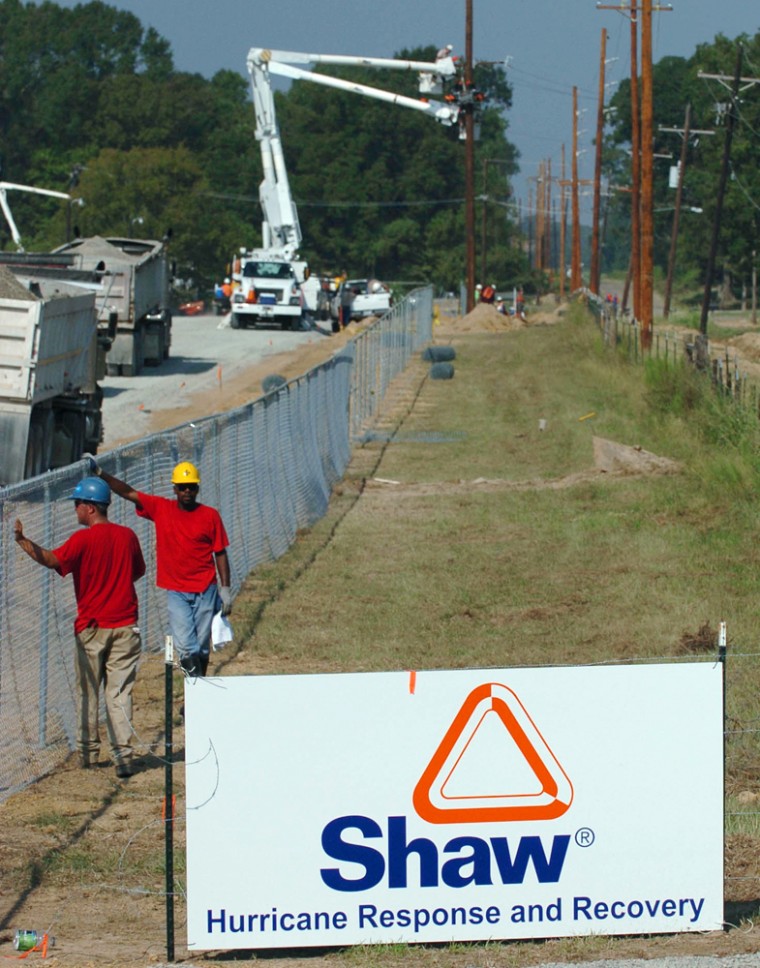Despite a month-old pledge, the Federal Emergency Management Agency has yet to reopen four of its biggest no-bid contracts for Hurricane Katrina work and won’t do so until the contracts are virtually complete. A promise to hire more minority-owned firms also is largely unfulfilled.
The no-bid contracts for temporary housing, worth up to $100 million each, were given to Shaw Group Inc., Bechtel Corp., CH2M Hill Inc. and Fluor Corp. right after Katrina struck. Charges of favoritism helped prompt last month’s pledge by FEMA acting director R. David Paulison, but now officials with the Homeland Security Department, which oversees FEMA, say the contracts won’t be awarded again until February.
The disclosure dismayed some lawmakers and business groups that believe the Bush administration has not done enough to ensure Katrina contracts are spread around. In particular, they say small and minority-owned businesses in the Gulf Coast have been shortchanged.
‘FEMA’s performance falls far short’
FEMA promised to boost the number of contracts given to minority-owned businesses but in the last month the percentage has increased only slightly, from 1.5 percent to 1.8 percent of the $3.1 billion awarded. That’s still well below the 5 percent of federal contracts normally set aside for minority-owned firms.
“FEMA’s performance falls far short,” said Mississippi Rep. Bennie Thompson, ranking Democrat on the House Homeland Security Committee. “The federal government must make a major shift in both policy and implementation if the lives of the people of the Gulf Coast are to be effectively rebuilt and restored.”
Thompson said he would introduce legislation to require the Homeland Security Department to maintain a permanent database for small and minority-owned businesses to be hired as prime contractors, rather than lower-paid subcontractors.
“I am from Mississippi, and I know sharecropping when I see it,” Thompson said.
Harry Alford, president of the National Black Chamber of Commerce, decried the dearth of small and minority Katrina contracts as “shameful.” But he’s hopeful, noting that President Bush met with him and other minority leaders Thursday to discuss how to improve business opportunities.
“Less than 2 percent of contracts going to minority-owned businesses is totally unacceptable,” Alford said. “Now is show time. We’ve been hurt. I think our concerns have been taken seriously, and I believe we’re going to work it out.”
Political connections?
FEMA also has been criticized for the no-bid contracts. Officials said they awarded those contracts to speed recovery efforts that might have been slowed by competitive bidding, but critics saw it as a way to reward politically connected firms.
Bechtel CEO Riley Bechtel served on Bush’s Export Council from 2003-2004, and the Shaw Group’s lobbyist, Joe Allbaugh, is a former FEMA director and friend of Bush. Both companies have denied political connections played a factor.
On Oct. 6, acting FEMA chief Paulison declared he was “no fan of no-bid contracts” and pledged to reopen the four deals. But in testimony to Congress on Tuesday, Greg Rothwell, Homeland Security’s chief procurement officer, said rebidding won’t be done until February.
“Until then, the four companies will continue their work,” he told a Senate hearing chaired by Sen. Olympia Snowe, R-Maine, whose panel is reviewing government efforts to help small businesses rebuild.
FEMA will post advertisements for the work sometime this month. The work will not be prioritized for small or minority-owned businesses, but winners of the deals must submit written plans to DHS detailing efforts to award 40 percent of their subcontracts to small businesses.
Separately, FEMA will set aside up to $1.5 billion worth of work for small companies to maintain trailers housing Hurricane Katrina evacuees. The 15 contracts worth up to $100 million each will be awarded by Feb. 1, with eight of them specifically designated for minority-owned businesses.
Paperwork cited
Larry Orluskie, a Homeland Security spokesman, said FEMA had not reopened the contracts yet because it had to process paperwork. Meanwhile, officials are actively seeking to recruit smaller companies by holding workshops and through its Web site at www.dhs.gov/openforbusiness.
“It’s a process,” Orluskie said. “We can’t have a change with the push of a button. Statements of work have to be cleared.”
But the four major firms said this week they had not been notified of the rebidding other than from news reports following Paulison’s announcement. Two of them — CH2M Hill and Fluor — said their contract terms already had established that FEMA had an option to end the work in January.
“The February timeframe is news to me,” said John Corsi, spokesman for CH2M Hill, based in Englewood, Colo. He said the company had not decided whether it would submit a new bid if FEMA does not extend its contract. “We’ve been performing the work well, and we stand behind the job.”
Brenda Thompson, a spokeswoman for San Francisco-based Bechtel Group Inc., said by February “we expect to have hauled and installed all temporary housing units in our scope of work for FEMA.”
Shaw officials have said they intend to compete for the Katrina work once FEMA solicits new bids, saying they are confident they will win based on a strong track record in disaster relief.
